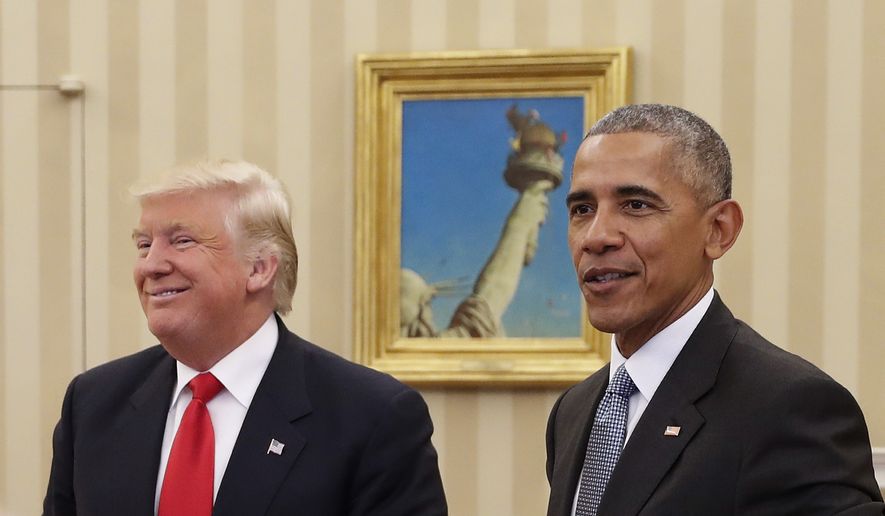As President Trump’s top advisers prepare to hash out a final policy on the Paris climate agreement dumped onto their laps by President Obama, another option has hit the table: Declare the deal a treaty and send it to the Senate to be killed.
The treaty option could emerge as the middle ground in the increasingly tense battle between “remainers” on the one hand, who say the president should abide by Mr. Obama’s global warming deal, and the Paris agreement’s detractors, who say Mr. Trump would be breaking a key campaign promise if he doesn’t withdraw from the pact.
Mr. Trump’s principal advisers are slated to meet Thursday to hash out a final set of recommendations for the president, with several deadlines looming next month.
At an initial meeting of top staffers Tuesday, several memos and letters that were circulated laid out the options, including the treaty proposal put forth by Christopher C. Horner and Marlo Lewis Jr., senior fellows at the Competitive Enterprise Institute.
Under their vision, Mr. Trump could toss out Mr. Obama’s decision that the Paris accord was an executive agreement, declare it a treaty and send it to the Senate, where it would need a two-thirds vote for ratification.
Given Republican control of the chamber, the agreement’s opponents say senators would either shelve the deal or outright defeat it. Either option would derail the deal, the memo suggested.
“That option affirms that we are a nation of laws, not men and, importantly, discourages both our negotiating partners and future U.S. officials against attempting to circumvent our system,” the memo says.
A briefing paper circulated among Republican senators this week said the deal should have been sent to Capitol Hill by Mr. Obama, but he “knew that Congress would never approve such a flawed deal, so he refused to seek the Senate’s advice and consent.”
Supporters of the Paris accord have their own memo drafted by lawyers in the State Department. That memo says that by sending the agreement to the Senate, the president would be giving up important powers and leave Mr. Trump and his successors open to congressional meddling.
“Because the large majority of international agreements concluded by the United States are concluded as executive agreements, this could have far-reaching implications for our conduct of foreign affairs,” the State Department document says.
The Paris agreement is the main international vehicle for trying to combat climate change. Mr. Obama committed the U.S. to the deal in 2015 but never submitted it for ratification, saying it was an extension of a U.N. Framework Convention on Climate Change, which the Senate ratified in 1992.
The State Department memo says there are few risks to remaining part of the Paris deal. It says the “legal obligations are relatively few and are generally process-oriented [and] discretionary in their application or repeat existing obligations already contained in the Framework Convention.”
Michael McKenna, a Republican energy strategist, said anything short of withdrawal would leave the U.S. open to legal challenges, with judges potentially attempting to enforce strict climate limits based on the commitments.
“The president is being asked to travel a path that leads him — ultimately — to continue the Obama administration policies on climate change,” said Mr. McKenna, who has authored his own memo calling for withdrawal.
He blamed Obama administration “holdovers” at the State Department for trying to preserve their former boss’ plans.
Mr. Obama committed the U.S. to cutting greenhouse gas emissions at least 26 percent below 2005 levels by 2025. The former president tried to enforce the commitment through a series of executive and administration actions, imposing tight limits on power plants and auto emissions.
Federal courts have halted some of those plans, and Mr. Trump and Congress have nixed others, easing the pressure on American industry. During the campaign, Mr. Trump also pledged to cancel the Paris deal.
As a decision nears, the sides among Mr. Trump’s top advisers have become clear.
Energy Secretary Rick Perry on Tuesday appeared to join the remainers, though he said the deal should be renegotiated.
“I’m not going to tell the president of the United States to walk away from the Paris accord,” Mr. Perry said at a conference sponsored by Bloomberg. “I will say that we need to renegotiate it.”
Mr. Perry said other countries are breaking their self-imposed commitments, giving the U.S. an opportunity to insist on changes.
Secretary of State Rex W. Tillerson is a remainer, as are perhaps Mr. Trump’s closest advisers, son-in-law Jared Kushner and daughter Ivanka Trump. The White House general counsel’s office also appears to be leaning toward remain, sources familiar with the negotiations said.
Environmental Protection Agency chief Scott Pruitt is pushing for withdrawal, and he is joined by U.N. Ambassador Nikki R. Haley, analysts said. Top presidential strategist Stephen K. Bannon is also a withdrawal advocate.
Exxon Mobil Corp. has written a letter urging the administration to stick with the Paris agreement, and the National Mining Association said this week, after its leaders met with Mr. Pruitt, that it will push for withdrawal, Politico reported.
The next test for the Paris accord will be in the middle of May, when finance ministers of the Group of Seven major economies meet in Italy. The heads of state meet at the end of the month.
The leaders are hoping for a communique reaffirming the Paris agreement, while opponents within the U.S. are hoping to prevent that, saying it would tie Mr. Trump’s hands going forward.
• Stephen Dinan can be reached at sdinan@washingtontimes.com.




Please read our comment policy before commenting.